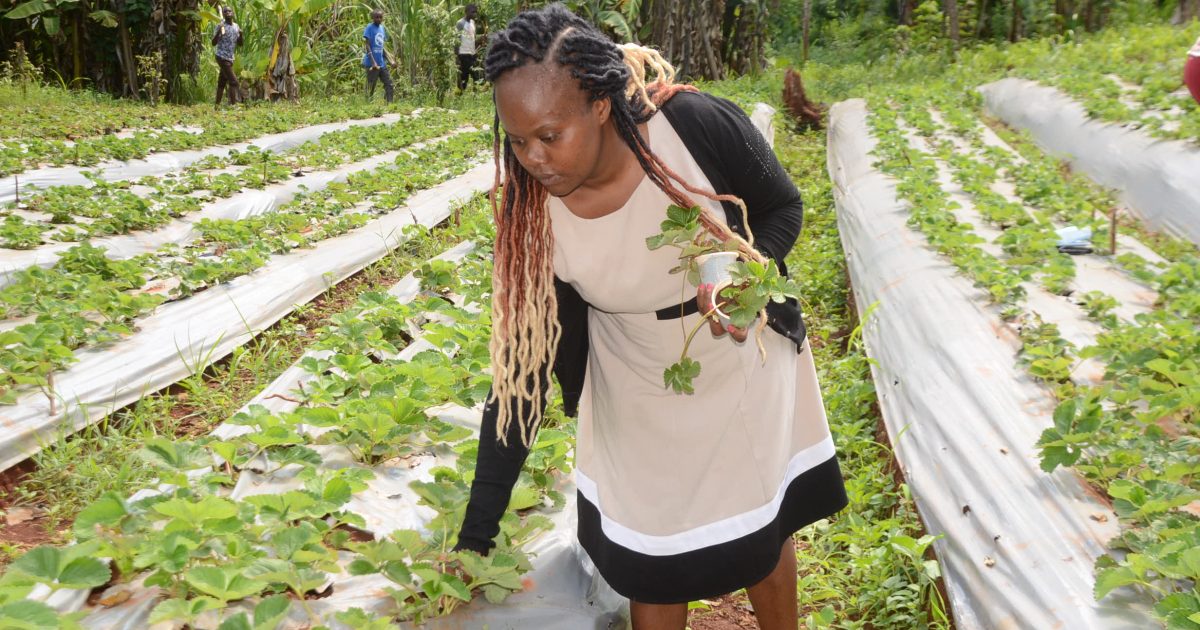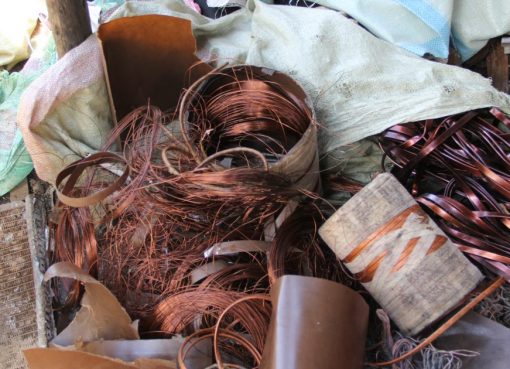In the wake of the Coronavirus pandemic that is wreaking havoc across the globe, economies are slowly sinking, jobs and millions of livelihood disrupted; the youth have made great strides in reinventing themselves to earn a living through valuable skills such as farming.
Edna Njoki Gachane knows this too well as she lost her job in the heat of the pandemic. She immediately ventured into strawberry farming less than a year ago and is making a huge returns out of it.
A few kilometres from Murang’a town, at St Mary’s village, down a rough sloping terrain we find Mrs. Gachane, who is in her mid-twenties tending to her strawberry plants. She is in the process of packing runners for sale.
Strawberry fragaria x ananassai is a cherry like fruit widely appreciated for its characteristic aroma, bright colour, juicy texture and sweetness. It can be consumed either fresh or in food.
In Gachane’s quarter acre piece of land, 6000 plants of the ever bearing chanderia variety of strawberry are blossoming.
Gachane reveals that last year her husband lost his job amidst Covid-19. Shortly after, she also lost her job in Nairobi and relocated back to Murang’a where they had been living before she got a job offer in the city.
“We combined our savings and grappled with the idea of growing garlic but upon research we realized that the idea was not viable since we would need a large storage area which is not guaranteed in rented apartments,” she said.
“We settled on strawberries. Since it only requires high initial capital for starting up after which the management cost is considerably low and the harvest is steady for three years,” she added
The couple leased land at St Mary’s area. She averred that being in close proximity to a water source is a prerequisite for successful strawberry farming. As such, in their piece of land, Murari River serves this purpose.
“With the land in place, we did a lot of research on strawberry farming, and contacted one Agronomist, Mr. Kimani, from Gatundu south,” Gachane said.
The agronomist carried out soil tests, water tests on the site and also supervised the land preparations.
She adds that Kimani also outsourced the seedlings for them from Kiambu and Nyeri after advising on the variety that most suitable for the hot and wet climatic condition of Murang’a.
Following the advice of the agronomist, Gachane settled on the chanderia variety which is ever bearing.
“When fed with the right nutrients the fruits can last up to 5 days, after harvesting, without refrigeration. It is also popular for its sweetness and strong flavor,” she affirms.
Gachane observed that the startup cost was quite high since they had to purchase drips for irrigation, mulch paper, water pumps and the strawberry seedlings. However, she opines that the returns are high since just six months into the venture, their agribusiness has already broken even.
“We started by selling runners to farmers around whereby one potted runner/seedling goes for Shs.50,” she noted.
According to Gachane, Strawberries mature in 3-5 months, although a bumper harvest is expected in the 6th month. Each plant can give 20grams weekly which is approximately 60kgs per week.

Ami’s farm as she calls it, has not managed to meet the demand in the market as people are quickly warming up to the idea of incorporating strawberries in their diets owing to the fruits nutritional value.
This purely organic farming of strawberries by Gachane has had its fair share of challenges.
“We started with 6, 000 plants, half of these dried up due to mismanagement occasioned by hiring different workers. We then decided to stick with one farm hand and to occasionally supervise the farm in person,” she noted
She argues that remote farming will yield disappointments so the farmer has to be involved in the farm and cannot leave it fully in the hands of workers.
She uses manure and nutrients such as boron, calcium and potassium for the berries as no fertilizers are used on her farm.
Strawberries do well in all types of soil with a PH of between 5.5 – 6.5 apart from sandy and clay soil types.
Notably caterpillars, grasshoppers and fungi attacks are eminent and the mother of one, uses rabbits’ urine to keep off pests. Consequently, she intends to rear rabbits in the farm to have an unlimited supply of the same.
The tourism and hospitality graduate from Karatina University urges the youth and those who recently graduated to venture into agriculture as today jobs are hard to come by in Kenya.
“In that piece of land, belonging to your parents or guardians; cultivate something like coriander, known as dhania, whose seeds go for as little as Shs.100 or even kales and spinach and upon maturity you can sell them and earn your Shs.1000 or more,” she advised.
She concluded by urging the youth to venture into the agricultural or manufacturing sectors so as to earn a living for themselves as well as create employment.
By Florence Kinyua and Purity Mugo





